Are you looking to learn WordPress and build a website? Ease of use is one of the best things about WordPress which makes it the world’s most popular website builder.
Learning WordPress does not require a lot of time or money. You can do it on your own, at your own pace, and then build upon it as you go.
In this article, we’ll show you how to learn WordPress for free in a week (or less). The goal is to help you familiarize yourself with WordPress and become able to build websites on your own.
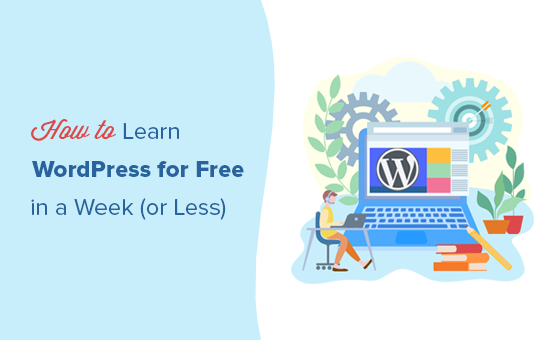
Why Learn WordPress?
WordPress is the world’s most popular open-source content management system. That’s a fancy way of saying that it allows you to create any type of website.
WordPress powers more than 36% of all websites on the internet. It generates thousands of job opportunities around the world, and there are millions of websites making money using WordPress.
Apart from economic opportunities, WordPress enables people to share their stories, ideas, build communities and do awesome things.
It is ideal for small businesses to make their online presence, at the same time it is economical enough for bloggers to launch their first blog.
WordPress also powers the most popular eCommerce platform called WooCommerce. It is used by millions of small and big online stores. You can use WordPress to start an online store (without writing any code).
With a ton of plugins and themes, WordPress is easy to extend and allows you to make any kind of website imaginable.
What do I need to learn WordPress?
Learning WordPress is easy as long as you are willing to commit a few hours each day for a week.
You would need some very basic search skills (i.e know how to use search engines like Google), and the ability to follow instructions.
No, you don’t need to know HTML or other programming languages to code a website. It will be helpful to learn them in the future, but you don’t need them to make a website using WordPress as a beginner.
The majority of WordPress users don’t have coding or programming skills, and they have been using WordPress for years.
Similarly, many successful WordPress developers started out just like you, and now they are making websites as full-time web developers.
Now that you are committed to learning WordPress, we want to welcome you to the awesome WordPress and WPBeginner community.
Let’s get started.
Monday: Getting Started with WordPress
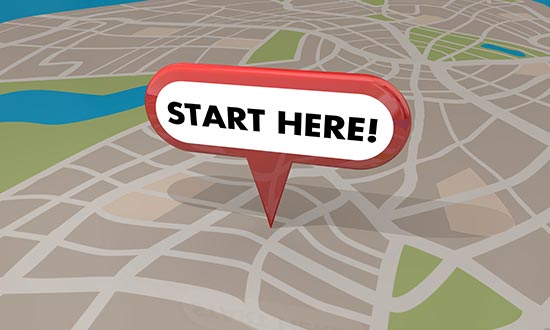
There are two types of WordPress websites. First, there is WordPress.org also known as self-hosted WordPress, and then there is WordPress.com.
We recommend using self-hosted WordPress.org because it gives you access to all the WordPress features out of the box. For more information, see our comparison of WordPress.com vs WordPress.org.
Now that you have chosen the right platform, the next step is to choose your domain and web hosting .
Your domain is the website address that users will type to visit you (example wpbeginner.com). We have a guide that will help you pick the best domain name for your website.
The next step is to choose web hosting. This is where all your website files will be stored, so users can view your site.
Normally, a domain costs $14.99 per year and web hosting starts from $7.99 per month. This is a lot of money if you are just starting out.
Luckily, Bluehost has agreed to offer WPBeginner users a free domain name and a generous discount on hosting. Basically, you can get started for $2.75 per month.
→ Click Here to Claim This Exclusive Bluehost Offer ←
If you want to look at a Bluehost alternative, then checkout SiteGround or see our guide on how to choose the best WordPress hosting.
Once you have signed up for a domain name and web hosting account, it is time to install WordPress.
WordPress is famous for its easy installation and most hosting providers also offer 1-click WordPress installers. If you need help, then follow our step by step WordPress installation tutorial.
We also have a step by step tutorial on:
- How to start a WordPress blog
- How to create a website with WordPress
- How to start an online store with WordPress
- How to make a membership site WordPress
- How to start a podcast with WordPress
For other dedicated tutorials, see our guide on different types of websites you can create with WordPress.
Once you have installed WordPress, you’ll reach the WordPress dashboard or the admin area. It has a sleek layout with a toolbar at the top and an admin sidebar menu on the left.
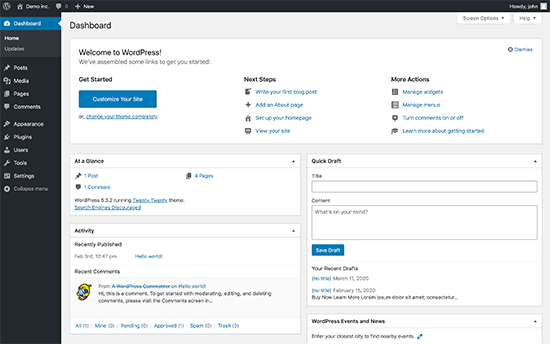
Congrats, you have created a WordPress site. However, your website is currently empty and uses a very basic design and no noticeable features.
In the next few days, you’ll familiarize yourself with the WordPress features and learn how to set it up to work for you.
Tuesday: Learning The WordPress Basics
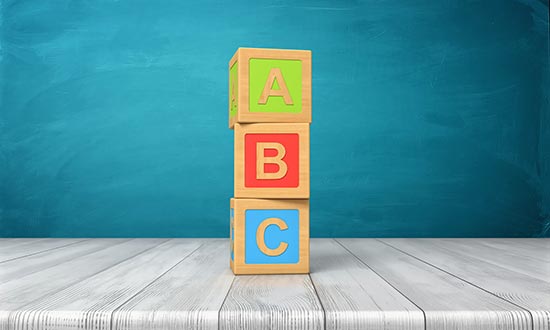
After installing WordPress, it is time to get familiar with the system. You can do so by going through options in the left-hand bar.
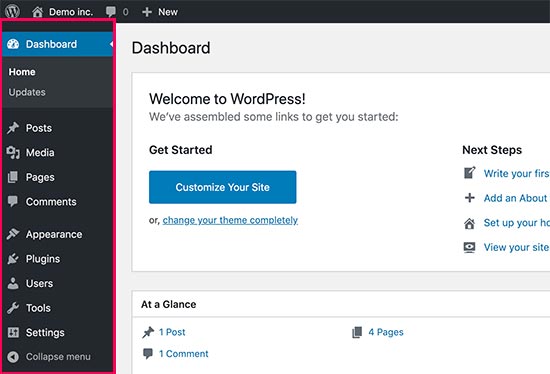
However, you may still need guidance on how to use each of the items you see in the WordPress dashboard.
The best place to start is our free WordPress video series for beginners. These 34 videos will guide you through the WordPress dashboard, show you how to add images, videos, audio, etc.
We recommend going through these videos as you work on your website. Don’t worry if you can’t watch them all at once. You can always come back and resume where you left off.
As you work on your website, you’ll come across terms that you may not understand. We have a handy WordPress dictionary with a list of commonly used WordPress terminology along with detailed explanation of each term.
Next, you should familiarize yourself with the WordPress block editor. This is where you’ll be spending most of your time when creating content for your website.
While you are at it, let’s go through some key WordPress concepts along the way.
- Difference between Posts vs Pages in WordPress
- Difference between Categoris vs Tags
- How to add images in WordPress
If you still have some time left today, then you should explore our beginners guide section which is full of useful information.
Hopefully by this time, you have a good grasp of your WordPress admin area, and you’re probably eager to play with plugins.
Wednesday: Using WordPress Plugins

The real power of WordPress is in the plugins.
Think of plugins as the apps for your WordPress website. They allow you to add new features to your website such as adding contact forms, create a store, etc.
There are more than 55,000+ free plugins available in the official WordPress plugin repository alone. This abundance of plugins can be overwhelming for beginners.
That’s why you should look at our beginner’s guide on how to choose the best WordPress plugin.
Now, as a beginner you may be wondering which WordPress plugins you should install. We have prepared a list of essential WordPress plugins for all types of websites.
We recommend every user to install a WordPress backup plugin, WordPress SEO plugin, and WPForms for your contact form.
Also, check out our WordPress Plugins category where you will find the best WordPress plugins to do anything you want on your WordPress website.
Exploring plugins will keep you busy for most of the day. Take your time to explore plugins that may help you grow your business.
When you come back, the next thing we’ll cover is WordPress themes.
Thursday: Using WordPress Themes
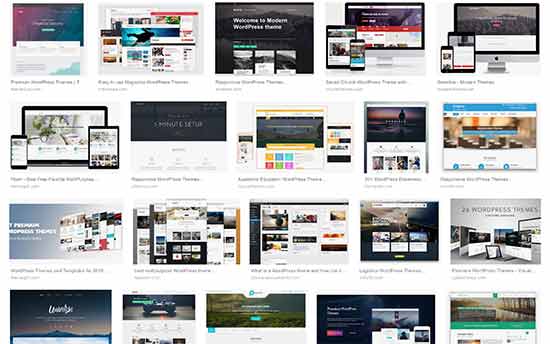
WordPress themes control the look of your website. Themes are pre-made templates that you can install and customize for your site.
There are thousands of free and premium themes available for WordPress. You can download free themes from the WordPress Themes directory.
For premium themes, you can go to commercial theme shops like StudioPress, Elegant Themes, Themify, etc.
A perfect theme should be a balance of beautiful design and powerful features. Too many features are not always a sign of a good Theme. Check out our guide on choosing the perfect WordPress theme for your website.
If you want to look at specific WordPress themes, then see our WordPress theme showcases:
- Best and most popular WordPress themes (all-time)
- Best free WordPress blog themes
- Best free WordPress business themes
- Best WordPress magazine style themes
- Best WordPress themes for photographers
Once you have found a theme, follow the instructions in our guide on how to install a WordPress theme to properly install it.
After that, refer back to our WordPress videos from Tuesday to see how you can change the background, add header images, add menus, and more in your WordPress theme.
Friday: Customizing WordPress
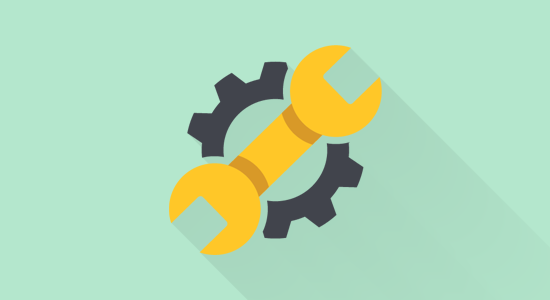
Each website has different customization needs. Depending on what you want to do with your website, you will come across new questions.
For example how to add a contact form, or create separate page for blog posts.
We recommend browsing through our WordPress Tutorials section which has 500+ step by step tutorials for beginners.
You can also subscribe to WPBeginner’s YouTube Channel for free WordPress video tutorials.
Continue Learning WordPress
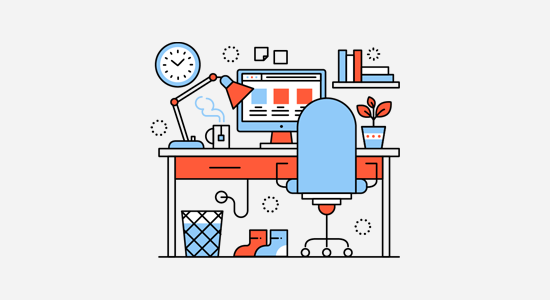
Hopefully, by the end of the week, you have been able to set up your website and familiarize yourself with how WordPress works.
However, WordPress is an incredibly powerful platform, and you’ll keep discovering new things as you work on your website.
The following are a few tips to help you continue learning WordPress.
As you come across a problem, you can search for it using the Search feature on our website.
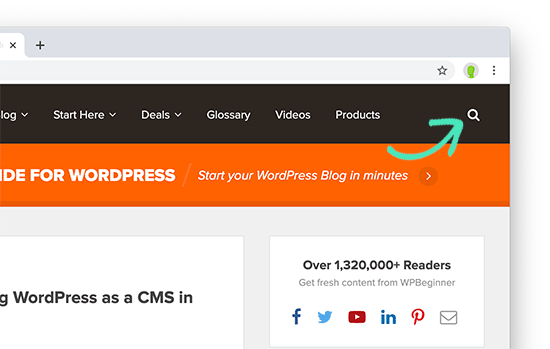
Alternatively, you can simply enter your question in Google and add WPBeginner at the end of your search query to find the most helpful answer.
As the largest WordPress resource site in the world, there is a good chance that you’ll find a step-by-step guide written specifically for beginners.
Can’t find an answer? Join our WPBeginner Engage Facebook group. It is an online community of WPBeginner users with more than 30,000 members. Our team of experts and other industry veterans are actively helping out users there (for free), and you’ll also get advice from other WordPress users as well.
How do I start learning WordPress development?
Many of our beginner users often graduate to intermediate and advanced level users. They ask us for guidance on learning how to code their own solutions.
WordPress is mainly written in the PHP programming language along with HTML, CSS, and JavaScript. We recommend starting with HTML and CSS and then move on to PHP and JavaScript.
Once you have learned a good bit of these languages, you can start learning how to code your own plugins and custom WordPress themes from scratch.
You can learn all these things for free using Google and free resources available. However, there are websites offering professional training courses in different WordPress development areas.
We hope this article helped you learn WordPress in a week. You may also want to see our guide on how to increase your website traffic, how to create an email newsletter, and how to speed up your WordPress site.
If you liked this article, then please subscribe to our YouTube Channel for WordPress video tutorials. You can also find us on Twitter and Google+.
The post How to Learn WordPress for Free in a Week (or Less) appeared first on WPBeginner.
from WPBeginner https://ift.tt/2BA6NtH
More links is https://mwktutor.com
No comments:
Post a Comment